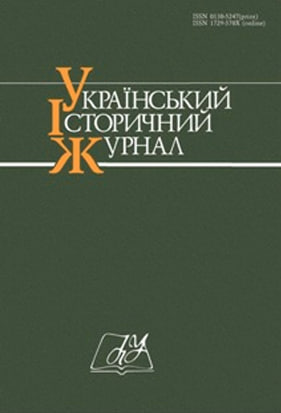On the Question of the Formation of the All-Russian Market: the Ukrainian Context (Second Half of the Seventeenth Century)
DOI:
https://doi.org/10.15407/uhj2022.05.168Keywords:
All-Russian market, Ukraine, Muscovy, Polish-Lithuanian Commonwealth, Ottoman Empire, Germany, merchantsAbstract
The purpose of the paper is to cover the competitive struggle of Ukrainians for foreign markets in the second half of the seventeenth century. The research methodology is based on the principles of historicism and determinism.
Both general scientific (system analysis, synthesis, analogy, generalization) and special historical (critical analysis and comparison of sources, comparability, problem-chronological) methods are used.
The scientific novelty. For the first time, the question of the legitimacy of the claims of previous historians about the functioning of the all-Russian market at that time is raised and the role of Ukrainians in this process is reconsidered.
Conclusions. Separating from the Polish-Lithuanian Commonwealth during the National Revolution, Ukraine acquired several fundamentally important economic problems. One of them was the possibility of free maritime trade. In particular, in the north the territory of the first covered part of the Baltic coast, and in the south the Ukrainian lands occupied by it had access to the Black Sea. Although decentralized, politically and economically weakened Poland could not fully guarantee trade across the Baltic Sea, where various foreign merchants, especially Germans, were determined to be powerful competitors, Ukrainians used this path. After leaving the Commonwealth, the situation in this matter, of course, became much more complicated. On the Black Sea coast, the power of Turks and Tatars, who were constantly at war with Muscovy, increased. By joining the Russian state, Ukrainian merchants formally joined the only seaside port in the distant and inhospitable Arkhangelsk, through which Muscovy conducted the most part of its foreign trade. However, nobody expected the new competitors with opened arms here. The road through Pskov and Novgorod to Narva, which was under Swedish rule, did not make things any easier. The division of Ukraine into several parts, mainly on the left bank and the right bank, greatly complicated domestic and foreign trade; merchants were defenceless against the authorities of that countries through which they passed. The local armed conflicts caused problems as well. The international situation in the second half of the seventeenth century caused a number of crisis economic and socio-political phenomena in the Polish-Lithuanian Commonwealth and the Ukrainian state, which nevertheless opened favourable prospects for Muscovy in the field of trade. At the same time, the trade interests of Ukrainians were not taken into account by the governments of many foreign countries. Competitive struggle in this area prompted the merchants of the Hetmanate to seek and establish new ways and markets for the sale of their products, in particular in Hungary, Moldaviia, Wallachia, the Baltic States and the East.


